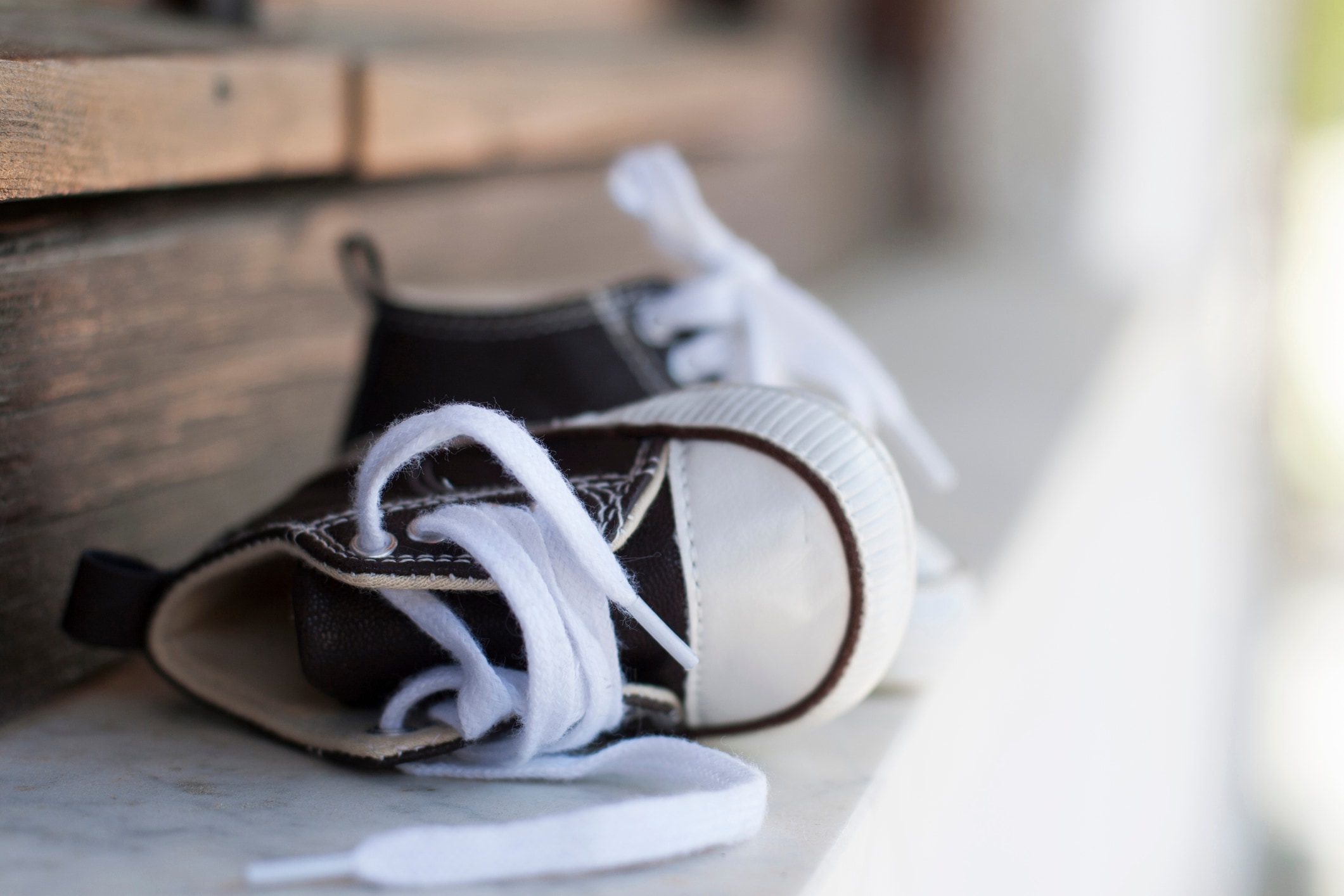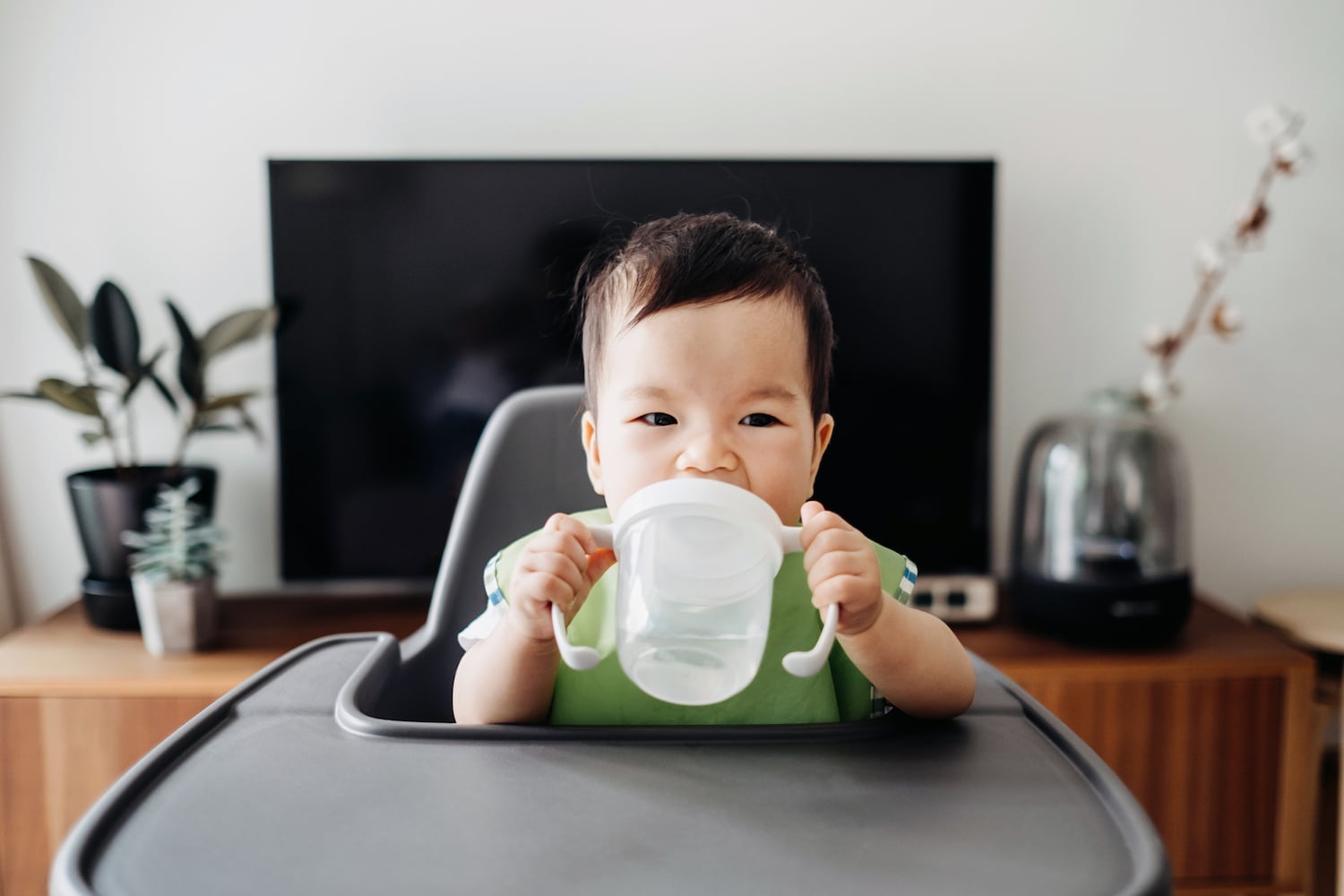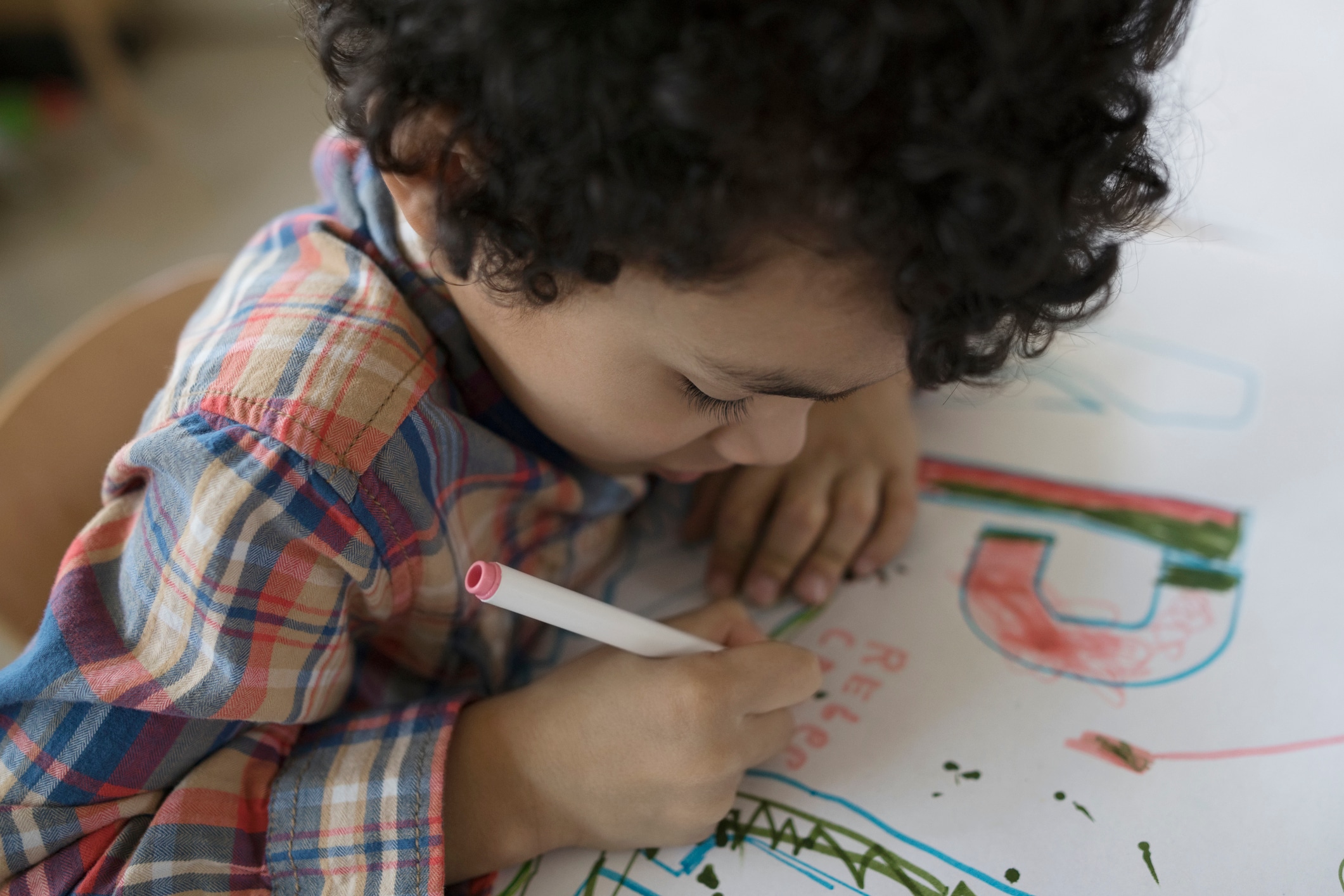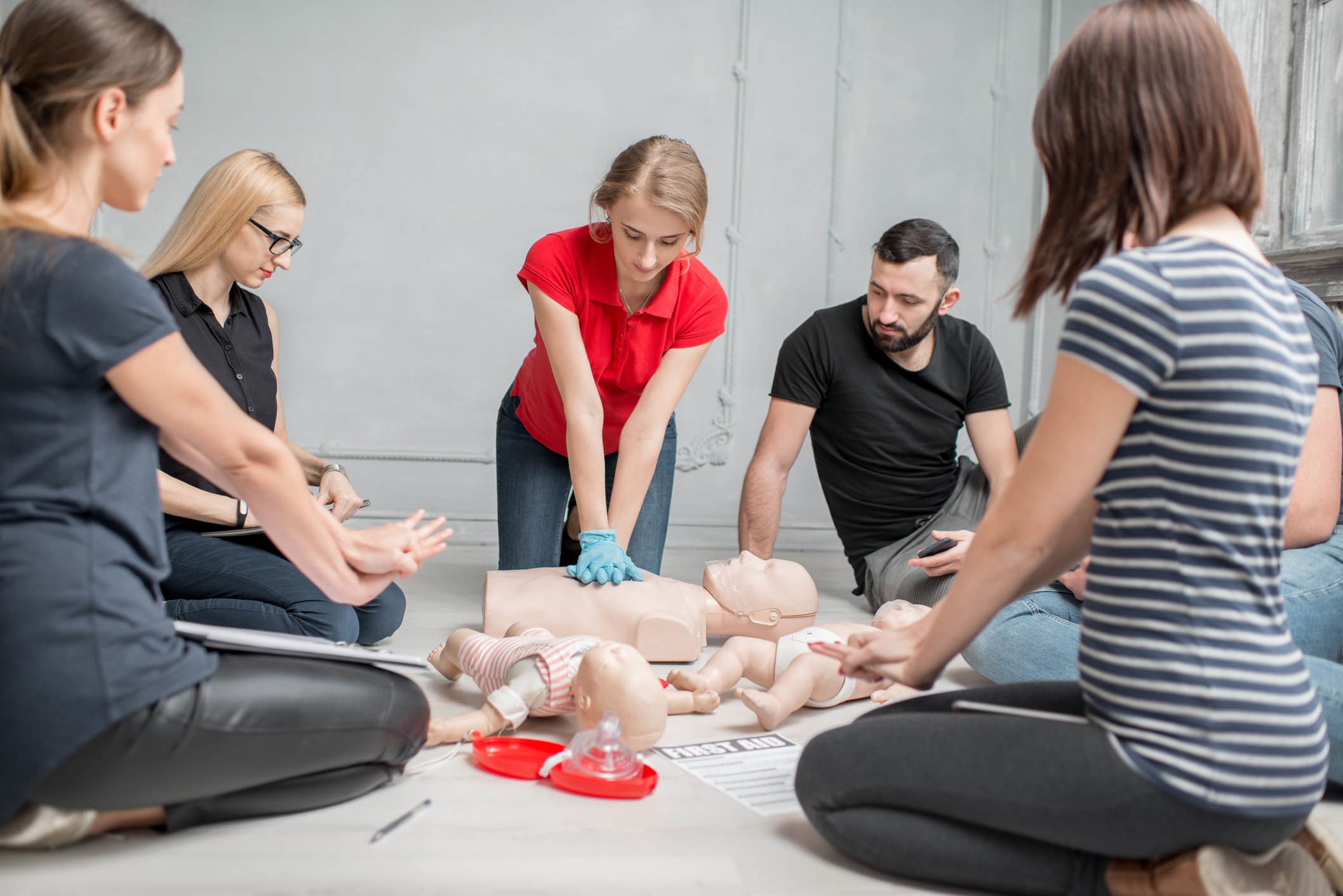Ah, the sweet sounds of a baby’s first real word. The joy! The excitement! The anticipation of what words are to be spoken next from those adorable little lips! Of course, when the first word is “dada” or “mama” (and it often is one of the two), it’s natural for the milestone to melt one parent’s heart and leave the other wondering, “Hey, what about me?”
Like most baby milestones, whether a baby says “mama” or “dada” first really depends on the child and several other factors — although it does seem that, historically, “dada” might have an advantage. “A lot of factors go into a child’s first word,” explains Dana McWilliams, a certified speech language pathologist in New York City, who adds that both the “m” and the “d” are early developing sounds. “Two [factors] that play the largest roles are what a child hears most often and their predisposition for a particular speech motor pattern.”
Of course, all children are different and, as in most areas of childhood development, the answer isn’t clear cut. Here’s what experts have to say about why kids might say “dada” or “mama” first and when you can typically expect to hear those precious words for the very first time.
Do babies say ‘mama’ or ‘dada’ first?
“Research shows that ‘dada’ is actually a more common first word,” notes McWilliams. “With that being said, over the course of our history, moms were typically the ones home with their babies and likely talking about dads at work or when dad will come home.”
Dr. Whitney Casares, a pediatrician in Portland, Oregon, and author of “The Working Mom Blueprint: Winning at Parenting Without Losing Yourself,” says “the ‘dada’-then-‘mama’ progression is more common.” She adds, however, that many researchers believe it might be easier for babies to say the “m” sound than the “d” sound though the research is not conclusive.
“Research shows that ‘dada’ is actually a more common first word. With that being said, over the course of our history, moms were typically the ones home with their babies and likely talking about dads at work or when dad will come home.”
— Dana McWilliams, certified speech language pathologist
“Some babies might find it easier and prefer to make the “m” sound while others might find it easier to make the “d” sound,” explains Niki Klein Imber, a Manhattan-based certified speech language pathologist. “That, plus the combination of what they hear at home, is going to influence the outcome.”
When do babies say ‘mama’ or ‘dada’ for the first time?
Adults can be eager to assign meaning to a baby’s babbling, but early on, it is often just that — babbling. “Babies may be babbling ‘mama’/’dada’ as early as 6 to 9 months,” says McWilliams. “The ‘m,’ ‘p,’ and ‘b’ sounds, quickly followed by ‘d,’ ‘g,’ and ‘h,’ are typically the first sounds babies babble. However, a first word is when the child assigns meaning to their babble. For example, vocalizing ‘mama’ for mom or ‘dada’ for dad. First words typically arise around 12 months.”
”I recommend parents speak with their pediatrician and reach out to a local speech language pathologist if their child isn’t using any words by 14 months.”
— Niki Klein Imber, certified speech language pathologist
Klein Imber agrees, noting that true words typically emerge between 9 and 14 months. She says that these words have to meet two basic requirements:
- They sound like the adult version of the word (although not perfect — a “nana” is a banana and a “ba” can be a ball).
- They’re used “in the presence of the person or object with intent.”
While “mama” or “dada” might not necessarily be their first word, it is usually one of them. Why? She explains that both words begin with early developing sounds, they are words heard frequently at home and they are words babies can use to gain attention.
“Most children — 90% — are able to use one word by 12 months and 10 words by 18 months,” says Klein Imber. ”I recommend parents speak with their pediatrician and reach out to a local speech language pathologist if their child isn’t using any words by 14 months.”
Casares concurs: “If a child doesn’t say ‘mama’ or ‘dada’ by 15 months, talk to your pediatrician for extra guidance.”
Join Care for free
Why do babies say ‘mama’ or ‘dada’ first?
Whether “mama” or “dada” comes first — especially when both words are frequently heard — may come down to language predisposition. “In my opinion,” explains McWilliams, “it depends on the child’s propensity for producing bilabial sounds, made with the lips (such as ‘m,’ ‘b,’ ‘p’), versus lingual sounds, made with tongue tip to the roof of the mouth (such as ‘d’, ‘t,’ n’). Each child has a motor pattern that comes more naturally to them.”
It is also influenced by what babies hear, remember and try to imitate. “A baby’s goal when babbling is to gain their communication partner’s attention,” says McWilliams. “What better way to do that than to repeat back what they hear most often?”
Casares also suggests a more primal reason for “dada” often getting the first-word honors. “Some linguistic specialists theorize [that] babies say ‘dada’ before they say ‘mama’ because they don’t identify mom as being separate from themselves initially,” she explains. “Instead, their identities are fused.”
As a mom who’s been home with my son from day one, I spoke all the time and in the third person to him (two recommendations McWilliams makes for promoting language development and for perhaps getting a leg up on “mama” being a first). Yet, “dada” was still my son’s first true word. At just 7 months old, he pointed and clearly said “dada” one day when my husband walked in from work. It was a while before I could confidently say that my precocious talker’s “meh meh” was an attempt at “mama.”
For other parents, though, “mama” was a consistent first. Lauren Kessler, mom of two from Marlboro, New Jersey, says that both of her children said “mama” first. She remembers hearing her son saying “ma, ma, ma” early on while feeding him. “I think from my excitement, he started saying ‘mama’ within a day or two after,” says Kessler. “My husband would say ‘dada’ — and my son would go ‘mama’ and giggle.”
Are certain sounds easier than others for babies to say?
As noted, both the “m” and “d” sounds are what McWilliams calls “early developing sounds” — but so are “b”, “p,” “g,” and “h.” “Words beginning with those sounds typically lend themselves to being early developing words,” McWilliams says of words like “ball,” “baba” for bottle, “bye,” “more,” “dog” and “hi.” “It isn’t a coincidence that ‘mama,’ ‘dada,’ ‘papa,’ and ‘baba’ are the most common names for mom and dad worldwide. They all begin with those early developing sounds.”
Jen Smith, a Manalapan, New Jersey mom of two, says both of her children said “dada” before “mama” — but it wasn’t the first word for either! “Both of my kids said ‘pop-pop’ [for their grandpa] before anything else,” recalls Smith. “I will admit, though, I wish they said ‘mama’ first.”
Imagine my own mom’s surprise when I pointed to a picture hanging above the couch and correctly uttered “bird” as my first word. (I am told “dada” came shortly after.)
Does a baby’s environment play a role in language firsts?
Experts agree with a resounding yes! “Across languages and around the world, first baby words tend to follow similar themes,” says Casares. “Many first words reflect a baby’s environment and the objects that tend to surround them or that others refer to, like ‘mommy,’ ‘daddy,’ ‘car,’ ‘cat.’”
Christine Jensen, mom of two from Moraga, California, recalls her older daughter saying “dada” first at 8 1/2 months old while they were traveling abroad. “I am convinced it was because we were only able to pack a handful of books to take with us for the entire trip and one of the books on repeat was “Dada” by Jimmy Fallon,” she says. Another early word? “‘Cat’ pronounced ‘tatat’ — which didn’t surprise us because we have two.” Jensen’s younger daughter, though, said “mama” first and early on at 7 1/2 months old: “She quickly figured out that if she called that word in the night, I would come to check on her.”
“If your baby hears ‘mama’ more frequently than ‘dada,’ the odds might be in favor of your baby using ‘mama’ first.”
— Niki Klein Imber
Of course, that also means that words babies do not regularly hear are unlikely to be among their firsts. “If a baby in an English-speaking home hears ‘dada’ frequently, they probably won’t start calling daddy ‘papa’ or ‘baba,’” explains Klein Imber. This might play out similarly if a baby has a single parent or two moms or two dads. In other words, “If your baby hears ‘mama’ more frequently than ‘dada,’ ” says Klein Imber, “the odds might be in favor of your baby using ‘mama’ first.”
The bottom line
Every baby is unique and different — but many of the tricks to speech development can be applied to all. “Focus on providing your baby exposure to a wide variety of words — and on face-to-face contact with your baby, free of distractions, and without the interference of screens,” suggests Casares. “Exposure to a spectrum of rich, diverse words, coupled with parent-child attunement matters more than a focus on repetition or verbal drills with our babies.”
“Exposure to a spectrum of rich, diverse words, coupled with parent-child attunement matters more than a focus on repetition or verbal drills with our babies.”
— Dr. Whitney Casares, pediatrician
Klein Imber agrees. “The best way to build your little one’s early language skills is to interact and talk with them throughout the day so that they can begin to attach meaning to things that are important in their immediate environment,” she says. “My top three tips for new parents looking to boost their little one’s early language skills is to talk, read and sing often!”
And, as for that “mama” or “dada” first? Good things come to those who wait — although it doesn’t hurt to repeat your name and repeat it often. And remember, says Casares, “No matter what word a baby says first — ‘dada’ or ‘mama’ — it doesn’t indicate a preference for one or the other.”





